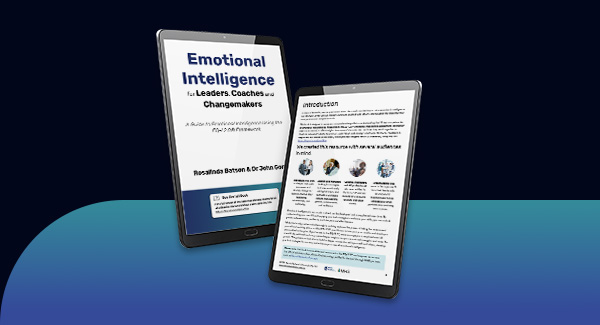Emotional Intelligence and Leadership: 5 Critical Skills for Navigating Uncertainty

The global economy is slowing down, posing significant challenges for businesses and leaders worldwide. The International Monetary Fund has described the world economic outlook as in for “a rocky recovery”. While, according to the World Bank, “The lagged and current effects of monetary tightening, as well as more restrictive credit conditions, are expected to weigh on activity in the second half of the year, with weakness persisting into 2024”. In the United States, the unemployment rate is rising, and the stock market is volatile. In China, the economy is growing at its slowest pace in decades. And in Australia, rising interest rates and the cost of living continue to have an impact.
In this uncertain economic climate, it's easy for leaders to feel overwhelmed and uncertain about the future. This may play out as frustration, anxiety, stress, or procrastination. As businesses and organisations face mounting pressures, it is essential for leaders to take decisive action, adapt their strategies and adopt a forward-thinking approach.
Emotional intelligence (EI) becomes a critical asset for leaders to effectively respond to the changing economic landscape. A 2019 meta-analysis confirms that “there is a positive relationship between emotional intelligence and leadership effectiveness”. This is because emotionally intelligent leaders are able to manage their own emotions while guiding their teams through change. These leaders can inspire resilience, boost employee morale, and maintain productivity even in challenging times.
Emotional Intelligence in Leadership - Five Critical Skills
Here are our top five critical EI competencies for successfully navigating change and uncertainty as a leader.
1. Flexibility:
The changing landscape demands a willingness to embrace innovation and explore new avenues for growth. Leaders must be willing to challenge conventional wisdom and seek out opportunities that may not have been previously considered. Flexibility allows leaders to adapt quickly to changing circumstances. They can assess new information, adjust their strategies, and make informed decisions in response to evolving situations.
2. Reality Testing:
Another vital aspect for leaders to focus on is risk management and reality testing. Reality Testing allows leaders to accurately read the situation and identify the need for change. With volatility in markets and unpredictable economic conditions, this becomes paramount. It's essential for leaders to identify potential vulnerabilities and develop contingency plans to minimise the impact of adverse events.
3. Decision-Making:
Strategic decision-making becomes more complex during economic downturns. Emotionally intelligent leaders possess the ability to analyse and evaluate information objectively while considering the emotional impact on individuals and teams. They can strike a balance between logic and empathy, making decisions that prioritise the long-term sustainability and well-being of the organisation and its employees.
4. Interpersonal Relationships:
Effective communication is vital, and leaders with high emotional intelligence possess exceptional interpersonal skills, enabling them to articulate their decisions, provide clear messaging and address concerns promptly. As job security becomes a concern for many individuals, leaders must nurture talent and prioritise employee well-being and engagement. A positive work environment is one where employees feel valued, respected, and supported. EI leaders can create this type of environment by being mindful of the emotions of their employees and by creating a culture of psychological safety. They foster employee engagement, motivation, and loyalty, even in the face of economic challenges.
5. Empathy:
When employees are feeling stressed, anxious, or uncertain, it can have a negative impact on their productivity and morale. Leaders who have high emotional intelligence are able to tune into the emotions of their employees and take steps to address their concerns. This empathetic understanding fosters trust, builds strong relationships, and enhances collaboration, which is essential for navigating economic challenges and finding innovative solutions.
Tips for Building Emotional Intelligence
Emotional intelligence leadership is a critical skill in any climate; however, it is especially important in times of economic uncertainty. By developing their emotional intelligence, leaders can make better decisions, build stronger relationships, and create a more positive work environment.
Here are some tips for leaders who want to improve their EI:
Take an EI assessment. This will help you to identify your strengths and weaknesses in terms of EI.
Read books and articles about emotional intelligence and leadership. There are many resources available that can help you to learn more about EI.
Find a coach or mentor to help you develop your Emotional intelligence leadership. Formal coaching can help you unstick bad habits and cultivate strengths.
Talk to other leaders about their experiences with EI. This can help you to gain insights and learn from others.
Practice EI skills. The best way to improve your EI is to practice the skills. This can be done in both your personal and professional life.
There is no doubt that the current global economic slowdown presents challenges that require leaders to think critically and act decisively. By embracing agility, fostering effective communication, prioritising risk management, and fostering trust, leaders can position their organisations to weather the storm and emerge stronger in the long run. It is in times of uncertainty that true leadership shines through, and it is an opportunity for leaders to demonstrate their resilience, adaptability, and ability to steer their organisations towards a brighter future.
Neural Networks Are Experts in Emotional Intelligence
Since 2000, Neural Networks has partnered with organisations to build the emotional intelligence capabilities of leaders through customised development programs. As one of Australia’s leading professional development providers, we deliver innovative learning development programs in emotional intelligence, leadership, sales, customer service and culture change.
Sign up for the Neural Networks Newsletter
Join our mailing list to receive information on leadership, sales, and emotional intelligence.

 +61 9555 7955
+61 9555 7955